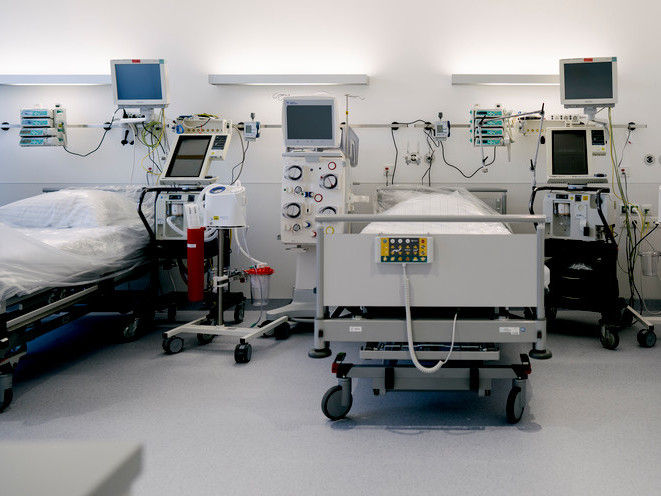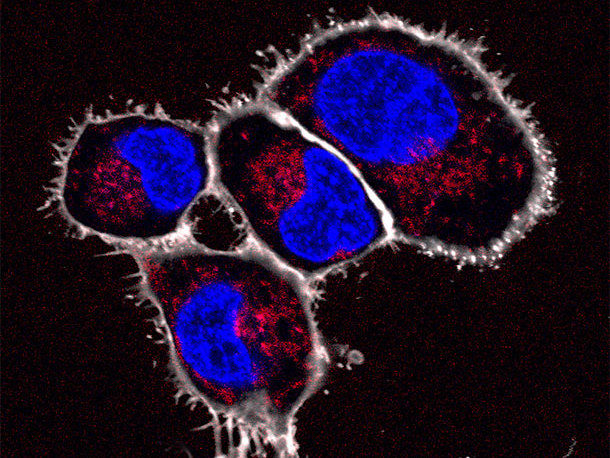Severe Covid-19 despite or even due to the strong immunity
What is the difference between patients who cope well with sars-cov-2 and those who have to go to intensive care?
Advertisement
Critically ill patients present a similar or even stronger immunity against the virus than convalescent patients. This supports the theory that severe infections might be linked to an exaggerated immune reaction.

What is the difference between patients who cope well with sars-cov-2 and those who have to go to intensive care?
© RUB, Kramer
A weak immune response isn’t the cause of dangerous lung failure in severe Covid-19 infections. Such infections seem, on the contrary, to be caused by an overreaction of the immune system. This is the conclusion made by a research team from Ruhr-Universität Bochum (RUB) and the university hospital of Duisburg-Essen led by Professor Nina Babel, Head of the Centre for Translational Medicine at the RUB clinic Marien Hospital Herne. The team from Marien Hospital and the department of Virology of Ruhr-Universität Bochum (RUB) as well as the Clinic for Infectious Diseases, the Clinic of Anesthesiology and the Institute for Virology of University Medicine Essen studied specific antibodies and T cells occurring in recovered, seriously ill and deceased Covid-19 patients. The researchers identified comparable immune reactions in clinical follow up. They report their findings in the journal Cell Reports Medicine from 29 August 2020.
How the immune system fights viruses
Antibodies and T lymphocytes are among the most important elements of the immune defence against viruses. The antibodies prevent viruses from entering the host cell by binding to certain virus receptors. They also mark the infected cells for other players in the immune system, which are able to kill the infected cells. Virus-specific T lymphocytes, on the other hand, can kill infected cells directly and highly efficiently.
During the last weeks, some studies have been published on the analysis of these cell-killing Sars-Cov-2 specific T cells in patients with Covid-19. The studies demonstrated detection of such cells in patients recovered from Covid-19 suggesting their protective antiviral effect. On the other hand, some studies indicate that an excessive immune response might be the cause of severe Covid-19. The role of Sars-Cov-2 specific T-cells in this exaggerated immune response is unclear.
Critically ill patients have the same or stronger immunity as recovered patients
In the current study, the research team analysed immune responses in Covid-19 patients during the disease progress. “This is how we wanted to investigate the role of T cells and antibodies in controlling the infection and the disease,” explains Nina Babel, who headed the study. “The novel aspect of our study is that we analysed Sars-Cov-2 specific T-cells and antibodies in relation to disease progression and viral clearance. We found that a strong T-cell and antibody response could be detected not only in patients with mild Covid-19 patients who had recovered from the virus infection.” Similar or even stronger immunity to Sars-Cov-2 was found in patients who had been critically ill and who suffered Covid-19-related lung failure.
“The total number of specific immune cells as well as their functionality was not better in patients who survived Covid-19 than in those who died from it,” says Dr. Ulrik Stervbo, head of laboratory at the Centre for Translational Medicine. There was also no difference in the strength and functionality of the immune response between patients who still suffered from and those who had cleared a Sars-Cov-2 infection.
Excessive immune response plays an important role
“Even though further studies will be necessary to understand the specific mechanism of Covid-19 development, our data suggest that excessive Sars-Cov-2-specific T cell response can cause immunopathogenesis leading to Covid-19-related lung failure,” points out Nina Babel. “The results of current studies on the successful application of immunosuppressive therapies in Covid-19 support this hypothesis,” concludes Professor Timm Westhoff, Director of Medical Clinic I at Marien Hospital Herne.
Original publication
Other news from the department science
Most read news
More news from our other portals
See the theme worlds for related content
Topic world Antibodies
Antibodies are specialized molecules of our immune system that can specifically recognize and neutralize pathogens or foreign substances. Antibody research in biotech and pharma has recognized this natural defense potential and is working intensively to make it therapeutically useful. From monoclonal antibodies used against cancer or autoimmune diseases to antibody-drug conjugates that specifically transport drugs to disease cells - the possibilities are enormous

Topic world Antibodies
Antibodies are specialized molecules of our immune system that can specifically recognize and neutralize pathogens or foreign substances. Antibody research in biotech and pharma has recognized this natural defense potential and is working intensively to make it therapeutically useful. From monoclonal antibodies used against cancer or autoimmune diseases to antibody-drug conjugates that specifically transport drugs to disease cells - the possibilities are enormous



















































